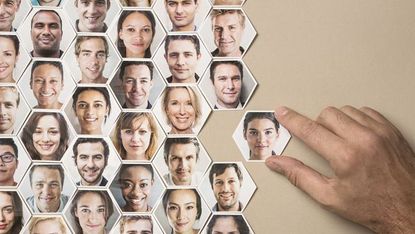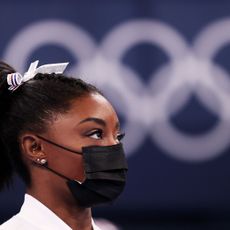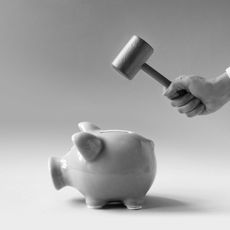What Your Profile Picture Is Really Saying About You
Is your mediated self digging you in a hole?

Anytime a photo is posted or published for the wider world to see, there are endless consequences beyond the validation of a "like," so what real bearing does a single photo have? And who sees it?
A recent Psychology Today article, unnervingly titled "Why Profile Pictures Are Liars," not only sheds light on the matter, but makes us rethink every self-portrait we've ever chosen for ourselves, or for that matter uploaded to social platforms. While, theoretically, our social media accounts are populated by close friends, sometimes creepy acquaintances, and highly observant, vocal family members, a profile picture has far wider reach than that. That tiny thumbnail graces the pages of our professional, social, and personal profiles and the impact of that innocuous picture can be lasting.
In their study, researchers queried participants online, asking them to view and rate headshots on personality characteristics including attractiveness, competence, creativity, meanness, trustworthiness, and intelligence without any additional information about that person. The portraits were all taken in similar lighting, but some varied by having the person show slightly different facial expressions. The shocking conclusion: "Virtually any change in photos of the same person altered participants' impressions of their personality just as much as viewing photos of different people altogether."
This notion goes beyond whether you find someone attractive or not—intelligence and temperament come into the fold as well. Despite what little merit is behind these conclusions, snap judgments can have a lasting impact. As our mediated selves extend to every nook and cranny of the web, a single profile picture can mean the difference between your next relationship, a substantial step in your career, new roommates, and dismissal.
Apps like Tinder are a perfect example of this. If you think someone is spending time crawling through your "about me" section to see if your interests align on a deeper level, you've been sorely misinformed. With the swipe of a finger, you've been cast into the potential partner box or rejected with no test in personal or social chemistry.
Similarly, profile pictures can act as a social gauge in your friendships and to your acquaintances. Especially in cities, when browsing potential roommates on Craiglist—and subsequently Facebook stalking these candidates— a single photo can have you deemed fun loving, interesting, or no dice.
Online personas can have legitimacy, though. Facebook can give someone insight into your unique style through thoughtful angles, filters, and well-crafted outfits. LinkedIn photos can showcase your professional edge through a high quality picture or a polished outfit. Instagram photos can indicate that you're a free spirit or a refined traveler. But ultimately, one quick look can correctly or incorrectly put you in a box— and without further investigation, this categorization can stick.
Stay In The Know
Get exclusive access to fashion and beauty trends, hot-off-the-press celebrity news, and more.
These findings may not be earth-shattering or revolutionary, but they do highlight the weight of a first impression—and without the context of a conversation or interaction are we discounting ourselves, friendships, or relationships without meaning to? Or is it really just as simple as a "like?"
-
 Keira Knightley's Winter Bermuda Shorts Are 'Pirates of the Caribbean'-Coded
Keira Knightley's Winter Bermuda Shorts Are 'Pirates of the Caribbean'-CodedShe confirms this unexpected trend is setting sail.
By Hanna Lustig Published
-
 Prince William Reveals His Surprisingly Low-Key Royal Christmas Plans
Prince William Reveals His Surprisingly Low-Key Royal Christmas PlansCount us in.
By Kristin Contino Published
-
 Prince William Declares He Has "Five Nostrils" in Hilarious Christmas Party Interaction
Prince William Declares He Has "Five Nostrils" in Hilarious Christmas Party InteractionThe Prince of Wales spread some holiday cheer to military families.
By Kristin Contino Published
-
 Senator Klobuchar: "Early Detection Saves Lives. It Saved Mine"
Senator Klobuchar: "Early Detection Saves Lives. It Saved Mine"Senator and breast cancer survivor Amy Klobuchar is encouraging women not to put off preventative care any longer.
By Senator Amy Klobuchar Published
-
 I'm an Egg Donor. Why Was It So Difficult for Me to Tell People That?
I'm an Egg Donor. Why Was It So Difficult for Me to Tell People That?Much like abortion, surrogacy, and IVF, becoming an egg donor was a reproductive choice that felt unfit for society’s standards of womanhood.
By Lauryn Chamberlain Published
-
 The 20 Best Probiotics to Keep Your Gut in Check
The 20 Best Probiotics to Keep Your Gut in CheckGut health = wealth.
By Julia Marzovilla Published
-
 Simone Biles Is Out of the Team Final at the Tokyo Olympics
Simone Biles Is Out of the Team Final at the Tokyo OlympicsShe withdrew from the event due to a medical issue, according to USA Gymnastics.
By Rachel Epstein Published
-
 The Truth About Thigh Gaps
The Truth About Thigh GapsWe're going to need you to stop right there.
By Kenny Thapoung Published
-
 The High Price of Living With Chronic Pain
The High Price of Living With Chronic PainThree women open up about how their conditions impact their bodies—and their wallets.
By Alice Oglethorpe Published
-
 I Used to Imagine Murdering the Men I Dated
I Used to Imagine Murdering the Men I DatedFalling in love helped me finally figure out why.
By Jessica Amento Published
-
 60 Workout Apps for Women Who Want Results (Without a Gym Membership)
60 Workout Apps for Women Who Want Results (Without a Gym Membership)Easy fitness plans you can follow without fear of judgment.
By Bianca Rodriguez Published